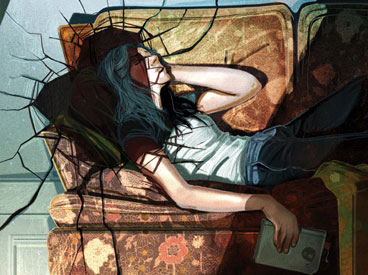Two days after the smashed window, I was in the school library reading A Moveable Feast, intoxicated by Hemingway’s intimacies and determined someday to live in Paris long enough to write my own book, even though that party—Fitzgerald, Stein, Sylvia Beach—had ended decades before. Today, as I write this, I have students whom I teach and two daughters, one at college and one still at home, waiting to hear where she will go to school next year. My students and my daughters have the same fascination with New York City of the 1970s that I had with Paris in the ’20s. Even the children of millionaires and billionaires—my students, not my own kids—yearn for New York grit, for Taxi Driver, Annie Hall, Death Wish, days of art movie houses and cheap rents. When I mention the crime back then, the threat of so much random violence, they’re even more intrigued, as though they’re sorry they missed out on that too.
Reading in the school library, I looked up from Hemingway’s Paris and saw it was time for cookies and milk in the cafeteria. Our school had small classes, rigorous teachers, and vanilla wafers every morning at 11.
I ambled down to the basement and thought nothing of it when the only person I saw by the cookie jar was Christine Evans, in the class below mine, who asked if I was upset.
“I guess so,” I said absentmindedly. Christine was driven to school every day in a chauffeured Rolls-Royce, but could she have known that it triggered in me a fit of annoyance whenever I saw her?
“Isn’t it simply awful?” She had a nasal, nearly British accent that I was sure she practiced like an instrument.
“Isn’t what awful?”
“Didn’t you hear? Ginger died this morning.”
“Who told you?”
“Mrs. Markham. She called everyone in your class into her office an hour ago. Weren’t you there?”
I shook my head, unable to speak, a chunk of cookie caught in my throat.
“She had cancer. Of the lymph nodes. It’s called Hodgkin’s. You get bumps all over your body. It’s absolutely hideous. And then you die.”
Now I remembered Ginger’s complaint of a bump under her chin but knew almost nothing about where she had been in between her rare days in school since then. I must have been looking at Christine in a daze, which she must have taken as an invitation to keep talking. “The big crisis is that the yearbook—your yearbook—was sent to the printer’s yesterday, and Mrs. Markham doesn’t know what to do about Ginger’s page.”
Each member of the graduating class, 22 girls and now 21, was given a full page to design herself, to celebrate herself and her upbringing. Most of the girls, including Ginger, had ruler-straight waist-length hair and had had themselves photographed for their pages posing against the iron grating outside the school’s doors. They picked quotations for the pages from Simon and Garfunkel songs or Judy Collins, or, I guess, Bartlett’s. Mine was from Gertrude Stein: “I am I yes sir I am I.” I nurtured my eccentricity. I wanted to be subtly and brilliantly outrageous, but I was clumsy, usually silent and smoldering, sloppily dressed, as out of place as a pigeon on an airport runway.
Somehow I got the news that our classes were canceled, and as I stood at my locker rearranging my books, I overheard my classmate Donna Robinson saying to Andi Goldstein, “Ginger was suspicious. Her parents were buying her all kinds of things. A present every day.”
I followed Donna down the stairs and asked who was going to the funeral.
She spun around and glared at me, her long, straight hair moving with her in a dramatic full twirl. “Everyone,” she snapped. “Aren’t you?”
No, I thought, probably not, but I said nothing and let her walk ahead of me. I couldn’t stand Ginger or Donna or any of them; their lives were so sheltered, so dull. They had never been on the subway, and one night our class went to a concert at Town Hall on 43rd Street. Ginger and Donna emerged from a cab making scared faces, but it was not a joke. “Where on earth are we?” one of them squealed.
I had walked there, and when girls were pooling money and splitting cabs to go home, I said, “I can’t afford it. I’ll walk.”
It had nothing to do with money. I loved the city at night. I loved walking alone. Midtown at midnight sparkled. Huge lamppost lights hovered above me, making my body cast strange shows on the sidewalk. The lights on Madison were dim and furtive, except those that shone on Miró prints in gallery windows. The doorman at The Carlyle smiled at me. I heard my boot heels click against the pavement and breathed the rhythms of the night. I wasn’t sure what else belonged to me that year, but I was certain the city was mine.
When I got home late the afternoon of Ginger’s death—I must have gone to a library after school let out—my father was sitting at the breakfast table with the Times, drinking from a heavy crystal glass like the one he’d lobbed across the living room two nights before. The huge window had been repaired, my mother had told me, the morning after, while I was at school, for $100—$600 or $700 today. An expensive little tantrum.
“Is Mom around?”
“I haven’t seen her.”
She had told me she was going to see a divorce lawyer, so she’d know the best way out of the mess we were in.
“A girl in my class died today,” I said and sat down across from my father, which I hadn’t done in months, though there was not a molecule of warmth in the air between us.
“What?” The most animated syllable he had spoken all winter.
“Hodgkin’s disease. D’you know what that is?”
“That’s what your cousin Larry had.” He was my mother’s nephew who died when he was 18 and I was 6. “Was this girl a friend of yours?”
“No. I don’t think I’ll go to the funeral.”
“You didn’t go to Larry’s, did you?”
“No. You said I was too young.”
My father was silent, his eyes not focused on me or anything else. “I said I’d never go to another funeral after that.”
“What happened?”
“You know the jokes about getting the babies mixed up in the maternity ward? The rabbi sounded like he’d gotten the bodies mixed up. Twice he said Larry’s name was Robert. Can you imagine how your aunt and uncle felt?”
The phone rang, and my father reached across the table to pick it up. A few seconds later, he said, “Let me change phones.” He handed me the receiver—“Hang this up when I tell you to”—and disappeared into my parents’ bedroom. I heard the door click shut and held the phone to my ear. A woman’s voice said his name and he barked, “Hang up.”
A few minutes later his face flashed at the entrance to the kitchen. “If you see your mother, tell her I had an appointment.”
I was eating cold spaghetti when she arrived, her eyes spookily black and blotchy, and I asked if she’d been crying.
“No, it’s just bitter cold out. Did my eye makeup run?”
“Did it ever.”
“Have you seen your father?”
I shook my head. “What did the lawyer say?”
She dropped down into the chair my father had recently left and wrinkled up her mouth, not wanting to begin—I knew the look. “He said your father can’t be counted on to support us when he leaves. We’re going to have to move, and you won’t be able to go to one of those fancy colleges your brothers went to. I’m sorry about that, but you’ll—”
“No, Mom, I’m going away. I’m going to whatever school I get into, and you’ll have to apply for financial aid, and—”
“You’ll have to get a job and help support me. And we may have to move to Queens.”
“The lawyer said this?” It took a great deal to bring me to anger, and this had done it. My temper was starting to flare. I had forgotten that Ginger had died that morning, that my father was with another woman, that my mother was facing ruination.
“He just said that we can’t count on your father and that—”
“You can’t make me stay,” I said and stood up, gathering my rage. “You can’t make me give up my life because of him.”
“Not permanently. I have a job interview to be a secretary.”
“Then you can take care of yourself.”
“This is still a family, and I will do what I can for you, but I can only—”
“You don’t need to do anything but let me go away in September.”
“Don’t plan on it, and don’t give me any lip. I get enough from your father.”
“The only reason he’s my father is because you chose him.”
Become a Saturday Evening Post member and enjoy unlimited access. Subscribe now



